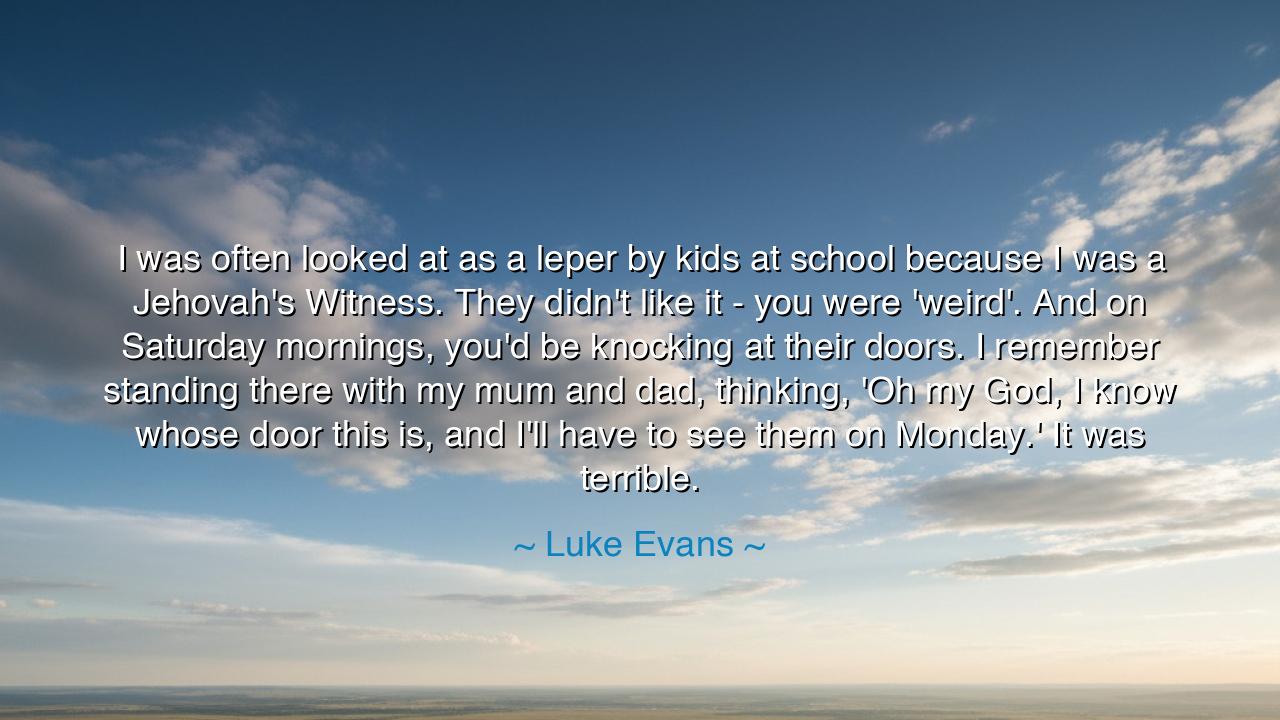
I was often looked at as a leper by kids at school because I was
I was often looked at as a leper by kids at school because I was a Jehovah's Witness. They didn't like it - you were 'weird'. And on Saturday mornings, you'd be knocking at their doors. I remember standing there with my mum and dad, thinking, 'Oh my God, I know whose door this is, and I'll have to see them on Monday.' It was terrible.






“I was often looked at as a leper by kids at school because I was a Jehovah’s Witness. They didn’t like it — you were ‘weird’. And on Saturday mornings, you’d be knocking at their doors. I remember standing there with my mum and dad, thinking, ‘Oh my God, I know whose door this is, and I’ll have to see them on Monday.’ It was terrible.” Thus spoke Luke Evans, the actor who rose from ridicule to reverence, from shame to strength. In this confession lies a truth as old as time: that the world fears what it does not understand, and that those who walk a path of difference must carry both burden and blessing. His story is not merely of a boy in a small town, but of every soul who has been marked as other—and yet endures.
The leper, in ancient days, was not only a victim of disease but of isolation. Cast out from the village, they lived beyond the walls, unseen yet always remembered with fear. In the heart of young Luke, the same exile took place—not of the body, but of the spirit. To be looked at as strange, to be whispered about, is to be banished from belonging. But it is from such exile that the fire of identity begins to glow. For those who walk alone learn to find strength in solitude, and compassion in the pain of rejection. What others see as shame becomes the birthplace of quiet courage.
The act of knocking on doors is more than a memory—it is a symbol. It is the hand of faith reaching out to a world that slams shut its entrance. Each knock is both a question and an offering: “Will you hear me? Will you let me in?” And for the young child who stands trembling before the door of a classmate, it is an act of both humiliation and bravery. He faces not strangers, but peers; not enemies, but potential mockers. Yet he knocks. This is the sacred paradox of conviction: that it asks us to stand firm even when the earth beneath us feels like quicksand.
History, too, bears witness to those who were cast aside for their faith or difference yet rose above it. Think of Galileo Galilei, who faced condemnation from the powerful for declaring that the earth moved around the sun. His truth made him a heretic, his brilliance a target. Yet centuries later, the world bowed to the light of his vision. Or remember Rosa Parks, who refused to yield her seat—not because she sought fame, but because she could not deny her own dignity. Like Evans, they endured the sting of being called “different”, and yet it was that difference that became their strength, their mark of greatness.
Luke’s recollection speaks not of resentment but of understanding. The child who once stood ashamed on doorsteps became a man who stood proud on stages. The pain of rejection became the fuel for empathy; the awkwardness of faith became the rhythm of authenticity. For when one has lived through the gaze of judgment, one learns the precious art of not judging others. The one who was mocked learns mercy; the one who was silenced learns the deeper music of compassion. Thus, from ridicule blooms resilience.
The lesson, then, is not merely about religion or childhood—it is about the sanctity of being true to oneself when the world calls you strange. Every soul will one day stand before a door, trembling with fear of rejection. But still, knock. Knock not to be accepted, but to affirm your own voice. The doors that close are not your defeat; they are the universe’s way of teaching you to find your own light, your own path, your own strength. For in the end, the hand that knocks is stronger than the hand that hides.
So, my child, when the world calls you “weird”, wear the word as a crown. Let your difference be your distinction, your faith be your fortress. Whether your struggle is one of belief, of love, or of identity, remember the story of the boy who stood at the door and did not turn away. Endurance is the beginning of greatness, and authenticity is the truest form of freedom.
And when you meet another who stands where you once stood—awkward, afraid, or misunderstood—open the door wide. Smile with the kindness you once needed. For that is how the cycle of pain is broken, and the cycle of compassion begins anew. In this way, the once-shamed child becomes the quiet teacher of humanity, proving that those who were once looked at as lepers often become the healers of the world.






AAdministratorAdministrator
Welcome, honored guests. Please leave a comment, we will respond soon